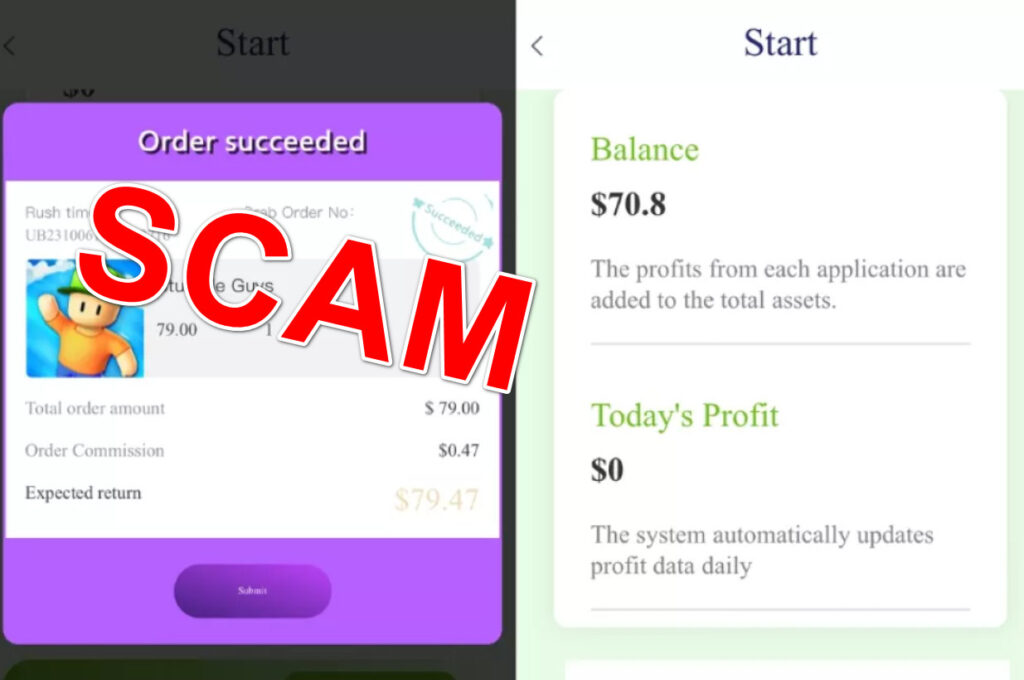A prolific job scam is targeting victims with promises of lucrative work-from-home roles at ChampionScott. Scammers pose as ChampionScott HR staff and promoters, leveraging the brand’s reputation to manipulate desperate job seekers via texts, messaging apps and social media.
- Overview of the ChampionScott Job Scam
- How the ChampionScott Job Scam Unfolds
- Identifying Fake ChampionScott Job Offer Messages
- How To Identify Fake ChampionScott Employment Websites
- What To Do If You Are Targeted by This Scam
- Avoiding the ChampionScott Job Scam
- Frequently Asked Questions About the ChampionScott Job Scam
- The Bottom Line
This article will examine how the ChampionScott job scam ensnares victims through elaborate ruses involving fake tasks, websites, and gradual siphoning of funds. We’ll also provide advice on avoiding this scam and measures to take if you are victimized.

Overview of the ChampionScott Job Scam
This prolific scam typically starts with unsolicited messages to victims’ phones, social media pages, or messaging apps like WhatsApp. Scammers posing as ChampionScott human resources staff or company promoters tout unbelievable remote positions paying $70-$150 per hour for simple 1-2 hour daily online tasks.
If recipients respond with interest in the flexible, high paying work-from-home jobs, scammers direct them to fake ChampionScott training websites. These scam sites, often using typosquatted domains like ChampionScott32.vip, ChampionScott-mall.vip, and ChampionScottmallvip.com, instruct victims to complete supposed trainings involving watching videos, liking posts, or clicking ads. For each completed “task”, dashboards on these fraudulent sites show victims accumulating earnings.
After a period of fake training tasks, scammers gradually request payments of increasing amounts, often citing needing small funds to “upgrade accounts” or “activate bonuses”. However, there are no actual jobs or payments. The sole purpose is eliciting as much money as possible from victims caught up in the convincing scam websites and dashboards.
In reality, the legitimate corporate brand ChampionScott is entirely unaffiliated with this fraudulent job scam. The company’s global recognition and reputation are simply exploited without permission by scammers to manipulate desperate job seekers struggling with unemployment.
Some known versions of fake ChampionScott job scam websites include:
- ChampionScottmall32.vip
- ChampionScottmall.vip
- ChampionScottmallvip.com
- ChampionScotttasks.com
- ChampionScottjobtraining.com
- ChampionScottvip.com
Scammers often intentionally include words like “mall”, “vip”, and “tasks” in their fraudulent site addresses. This makes the domains appear more credible to trick victims into thinking they are legitimate ChampionScott pages related to shopping, rewards programs, and work duties. Of course, the sites are completely fake and unaffiliated with ChampionScott. Still, the strategic wording helps scammers better disguise their deceitful sites as authentic.
Scammers frequently shutter domains and open new ones to stay ahead of detection. But no matter the URL, these false ChampionScott employment sites follow the same system of scamming victims through fake tasks and earning trackers while gradually siphoning away payments.
How the ChampionScott Job Scam Unfolds
From initial outreach to final extraction of funds, the ChampionScott job scam utilizes clever tricks and psychological tactics. Understanding the step-by-step methods provides insight into why this scam ensnares even wary victims.
1. Unsolicited Job Offer Messages
The first contact sees targets receive messages on various platforms advertising unbelievable ChampionScott work-from-home positions paying up to $150 per hour. Details mirror typical job scam promises of high pay for little effort.

2. Phony Association With ChampionScott
If recipients respond with interest, scammers claim they are active ChampionScott promoters or HR staff ready to hire. They reference the company’s real history and public information to boost credibility regarding the role.
3. Fake Onboarding Process
Scammers explain an onboarding program involving watching training videos, liking social posts, clicking ads, and easy tasks to earn commissions. This mirrors legitimate staff onboarding, with scammers fabricating corporate policies and practices.
4. Slick Dashboards to “Track Earnings”
Victims access polished dashboards showing simulated task activity and resulting dollars adding to balances. This sells the legitimacy prior to gradually requesting victim funds. Marks see “earnings” accumulate, believing the tasks and jobs are real.

5. Small Money Requests Under False Pretenses
After some onboarding activities, scammers require small payments framed as activating bonuses, accounts, or earnings. As little as $10-$15 may be requested first to normalize sending funds.
6. Gradual Increase of Transfer Requests
Over weeks, the transfer sizes increase into the hundreds then thousands of dollars. On the hook victims already “invested” psychologically and financially are unlikely to halt mounting payments.
7. Cutting Off Contact After Maxing Out Funds
Eventually after extracting maximal funds, scammers block victims. Fake ChampionScott dashboard accounts, site logins, and onboarding tasks vanish. No salary or payments materialize, only loss.
Identifying Fake ChampionScott Job Offer Messages
This scam depends on scammers using WhatsApp, Telegram, SMS texts, and social media to send initial unsolicited messages. Learning how to spot fraudulent job offers on these platforms is key to avoiding being manipulated.
Here are common red flags to recognize:
1. Messages Arrive Unexpectedly
Legitimate recruiters contact candidates who have specifically applied for open roles or submitted resumes/profiles. Cold messages touting jobs out of the blue signal scammers blanket-blasting texts to masses to increase likelihood of ensnaring victims.
2. Guarantees High Pay for Little Work
Beware messages selling “easy” online work from home paying unrealistic hourly wages up to $150. This entices desperate job seekers specifically. Actual openings would outline competitive realistic pay based on average market rates.
3. Requests Personal Details
Scammers may request private information like bank accounts, IDs, or passport details to “formalize” hiring. Real recruiters would not ask this prior to formal interviews and vetting.
4. Poor Grammar/Spelling
Messages may contain awkward syntax, misspellings, improperly used idioms, or other linguistic indicators of non-native English speakers. This suggests oversees scam groups targeting English speakers.
5. Pressure to Act Quickly
Fraudsters urge fast action to sign up for tasks or provide payment to secure non-existent limited positions. Recruiters don’t pressure candidates, rather outline hiring processes and timelines clearly.
6. Requests Upfront Payments
Scammers may require paid sign up “deposits”, “training fees”, or “account upgrades” to start working and earning. Legitimate companies never demand candidates invest their own money for employment.
7. Omits Company Contact Info
Messages lack any phone number, email, LinkedIn profile or other means to directly contact the supposed recruiter. This avoidance behavior prevents victims vetting identities.
How To Identify Fake ChampionScott Employment Websites
In addition to suspicious outreach messages, the ChampionScott job scam relies on fake training sites that at first glance appear legitimate. Learn how to spot fraudulent domains exploiting the brand’s likeness.
Check URLs Carefully
Scam sites use slightly altered web addresses or typosquatting to pose as real ChampionScott pages. Examples include using “ChampionScott” with prefixes like “jobs” or “careers” or inserting words like “apply”, “training” or “task”. Watch for:
- ChampionScott-mall22.com
- ChampionScottvip82.com
- ChampionScotttasks.vip
- ChampionScottmall22.com
None are actual ChampionScott addresses. The official domain is kingsleygate.com. Identify fakes by comparing thoroughly.
Site Registration Details Are Hidden
Use WHOIS domain searches to check registration info. Scam sites use proxy services to hide owners’ names and locations. Genuine brands register sites transparently to real business entities.
Images Don’t Match ChampionScott’s
Scammers lift product images or insert fake ChampionScott branding that seems convincing but doesn’t precisely match legitimate web and marketing assets. Subtle differences expose fraudulent sites.
Site Purpose Not Explained
Besides showing login pages, scam sites provide little detail on their exact nature and relationship to ChampionScott. Genuine corporate pages explain site goals, terms of use and detail integration with real-world stores/services.
Contact Info Leads Nowhere
Links, emails and phone numbers on scam sites either don’t work or reach unrelated parties. Fraudsters make contact details unusable or fake to avoid victims trying to validate legitimacy.
Trust instincts if something seems suspicious about sites you are directed to for supposed ChampionScott opportunities. Verify details meticulously to uncover impersonating frauds seeking payments through deception.
What To Do If You Are Targeted by This Scam
If you receive questionable ChampionScott job leads, cease engagement to avoid being defrauded. Here are key steps if you were already manipulated into sending money:
Step 1: Stop All Contact
Immediately cut off contact with supposed ChampionScott reps or promoters in texts/messaging apps. Block their accounts and resist further engagement no matter how convincing on recouping losses.
Step 2: Gather Evidence
Before blocking them, capture all available identifying details on the scammers. Save text screenshots, transaction records, usernames and site logins.
Step 3: Contact Your Bank
If bank transfers were made, contact your bank immediately. Report unauthorized charges and suspicious activity. Freeze/cancel affected accounts.
Step 4: Notify ChampionScott
Contact ChampionScott directly to report the scam attempt. Provide details on active fraudsters misusing the brand so they can explore legal avenues to combat impersonation.
Step 5: File Police Reports
Submit detailed scam reports with the FTC and FBI Internet Crime Complaint Center. Include all screenshots and transaction specifics to aid investigations into global job scam rings.
Step 6: Learn From This
Leverage this costly experience to heighten awareness around protecting your funds and data when seeking or contacted about job opportunities going forward. Use it to educate others on related fraud tactics.
Avoiding the ChampionScott Job Scam
Here are key warning signs when assessing unsolicited job leads tying to ChampionScott or other major corporations:
Watch For Unsolicited Offers
Exercise skepticism regarding any unprompted remote job opportunities, especially via blast texts or social media messages, as this signals fraudsters.
Vet All Provided URLs
Thoroughly inspect any sites sent to complete so-called tasks or training programs. Confirm web addresses match official company domains precisely to uncover imitations.
Look For Contact Urgency
If recruiters pressure urgency to accept offers or provide personal/financial details, exercise extreme caution. This reflects scam rush tactics to prohibit proper vetting.
Never Pay Upfront for Jobs
Avoid paying any requested deposits, subscription fees or starter costs to secure job opportunities. Legitimate roles won’t require you to pay just to begin working.
Confirm Video Interviews Before Applying
Insist on scheduling phone or video interviews with hiring managers before sharing documents or data. Scammers will provide excuses to avoid verbal discussions that may reveal lies.
Trust Your Instincts
Listen to inner gut feelings about whether unsolicited offers seem suspicious, inconsistent or fraudulent. Don’t ignore this intuition warning of potential scams seeking to exploit desperation.
Frequently Asked Questions About the ChampionScott Job Scam
What exactly is the ChampionScott job scam?
The ChampionScott job scam involves unsolicited messages offering unbelievable remote jobs with ChampionScott paying over $100 per hour for little effort. However, it is an elaborate fraud exploiting the brand’s reputation. Victims pay increasing funds to scammers posing as HR staff for fake hiring tasks, when no jobs or payments actually materialize.
How does the ChampionScott job scam work?
- Victims receive random messages via text/WhatsApp about lucrative ChampionScott work from home roles.
- Scammers posing as company reps claim victims must complete simple video watching/ad clicking tasks to get hired.
- Victims access fake sites tracking supposed “earnings” from tasks.
- Scammers require gradually increasing payments to advance fake job levels, training, bonuses, etc.
- All communication ceases once maximal funds extracted from victims. No salary paid.
What platforms do scammers use?
Initial messages originate via SMS text, WhatsApp, Telegram, Facebook messenger, etc. This shifts to fake ChampionScott task websites hosted globally using typosquatting and misspelled domains. Email and phone may also be incorporated in the scam process.
What are some fake site URLs used?
- ChampionScott32.vip
- ChampionScott-mall.vip
- ChampionScottmallvip.com
- ChampionScotttasks.biz
How can I recognize fake job offers?
Watch for unsolicited random contact, urgent pressure, guaranteed unrealistic pay and tasks, cryptocurrency payment demands, and other warning signs outlined here.
Should I pay any requested funds?
No, never pay any upfront fees for supplies, training, subscriptions, account upgrades etc. Real hiring doesn’t require you spending money to start working. Any payment requests enable the scam theft.
Can I get back money lost to this scam?
Potentially yes depending on specific circumstances like platforms used. Contact your bank immediately about unauthorized charges for the best chance at reversing payments. Recovery services may also help reclaim lost money.
How can I avoid this ChampionScott job scam?
Be wary of unsolicited recruitment messages offering unbelievable remote pay rates. Vet all web links fully rather than clicking directly. Report suspicious contacts, don’t engage. Signs like urgency, crypto-only etc. indicate fraud attempts.
The Bottom Line
The ChampionScott job scam provides a sobering reminder of carefully scrutinizing unprompted remote work offers, no matter how appealing. While scammers become increasingly sophisticated, awareness of key warning signs can empower users to halt engagement early before being defrauded.
Desperation driven by financial duress or unemployment can cloud judgment of scam risks. Avoid this by listening to instincts guiding you away from fraudulent schemes misusing trusted corporate brands and promising unrealistic opportunities. With caution, potential victims can protect themselves.



